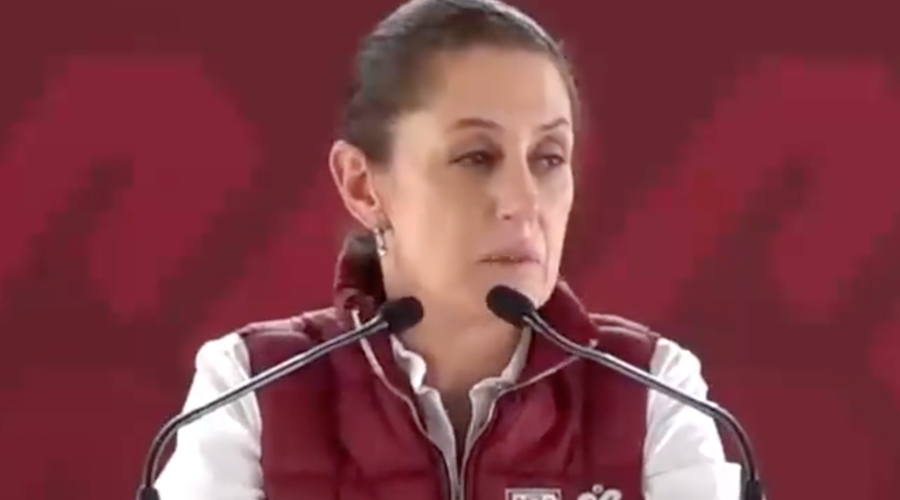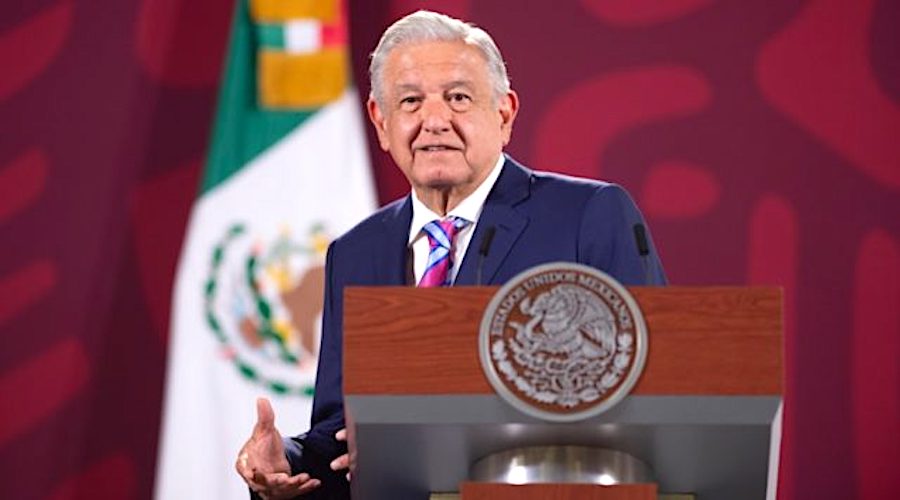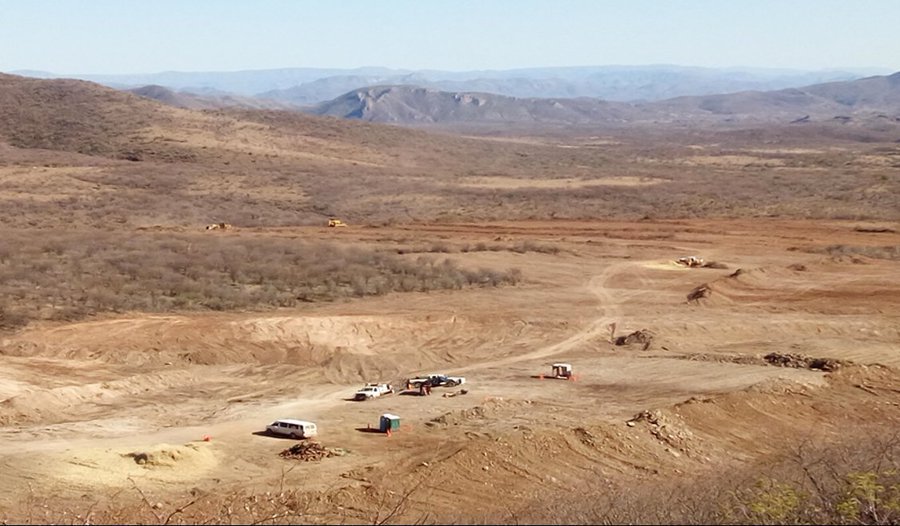Staff Writer | April 24, 2022 |

Claudia Sheinbaum, head of the government of Mexico City.
(Image by the CDMX government, Twitter).
Following the nationalization of the lithium industry approved by the country’s Senate on April 21, Claudia Sheinbaum, head of the government of Mexico City, said during a public speech over the weekend that the decision is comparable to the nationalization of the oil industry approved during the presidency of Lázaro Cárdenas, 84 years ago.

“What did President Lázaro Cárdenas do in 1938? He nationalized oil. For what? So that oil was used for the well-being of the Mexican people and so that foreign companies would not take it away,” Sheinbaum said. “Well, what President López Obrador did is similar to what General Lázaro Cárdenas did: he gave lithium back to Mexicans.”
The government official said that prior to the approval of the new law, lithium deposits could be privatized and that many foreign mining companies would take it and give very little in return.
Sheinbaum also said that the opposition MPs who voted against the initiative betrayed their country, while those who voted for it are “nationalists committed to their country.”
The new law elevates lithium to the category of “strategic mineral,” declaring the exploration, exploitation, and use of lithium to be the exclusive right of the state. It also includes a clause allowing the state to take charge of “other minerals declared strategic” by Mexico.
Since the bill was passed, 90 days started running for the executive to create a new, decentralized body to deal with all lithium-related matters, which means that no new concessions, permits or contracts will be granted.
When announcing the approval, López Obrador said his administration will review all lithium contracts, which casts a shadow of doubt over projects already being developed in the country, including the one held by Bacanora Lithium (LON: BCN) in the country’s northwest.
Following the nationalization of the lithium industry approved by the country’s Senate on April 21, Claudia Sheinbaum, head of the government of Mexico City, said during a public speech over the weekend that the decision is comparable to the nationalization of the oil industry approved during the presidency of Lázaro Cárdenas, 84 years ago.

“What did President Lázaro Cárdenas do in 1938? He nationalized oil. For what? So that oil was used for the well-being of the Mexican people and so that foreign companies would not take it away,” Sheinbaum said. “Well, what President López Obrador did is similar to what General Lázaro Cárdenas did: he gave lithium back to Mexicans.”
The government official said that prior to the approval of the new law, lithium deposits could be privatized and that many foreign mining companies would take it and give very little in return.
Sheinbaum also said that the opposition MPs who voted against the initiative betrayed their country, while those who voted for it are “nationalists committed to their country.”
The new law elevates lithium to the category of “strategic mineral,” declaring the exploration, exploitation, and use of lithium to be the exclusive right of the state. It also includes a clause allowing the state to take charge of “other minerals declared strategic” by Mexico.
Since the bill was passed, 90 days started running for the executive to create a new, decentralized body to deal with all lithium-related matters, which means that no new concessions, permits or contracts will be granted.
When announcing the approval, López Obrador said his administration will review all lithium contracts, which casts a shadow of doubt over projects already being developed in the country, including the one held by Bacanora Lithium (LON: BCN) in the country’s northwest.
Mexico nationalizes lithium mining
Cecilia Jamasmie | April 21, 2022

Andrés Manuel López Obrador.
(Image courtesy of Mexican President’s Office.)
Mexico has officially nationalized its lithium industry after the Senate approved by 87 votes in favour, 20 against and 16 abstentions the mining reform proposed by President Andrés Manuel López Obrador, which gives the state exclusive rights over the battery metal.

The law, which came into force on Thursday, was approved in record time — only two days after introduced by López Obrador to Congress.
The bill elevates lithium to the category of “strategic mineral”, declaring the exploration, exploitation, and use of lithium to be the exclusive right of the state. It also includes a clause allowing the state to take charge of “other minerals declared strategic” by Mexico.
The executive has now 90 days to create a new, decentralized body to deal with all lithium-related matters.
Since taking power in 2018, López Obrador has fought to reverse resource reforms under previous governments, which opened up the oil and electricity sectors to private investment. He has pushed a resource exploitation model that gives priority to state-controlled companies.
The President said his administration will review all lithium contracts, which casts a shadow of doubt over projects already being developed in the country, including the one held by Bacanora Lithium (LON: BCN) in the country’s northwest. The company, owned by China’s Genfeng Lithium, owns the giant Sonora project, which is slated to produce 35,000 tonnes of the metal per year starting in 2023.

Mexico has officially nationalized its lithium industry after the Senate approved by 87 votes in favour, 20 against and 16 abstentions the mining reform proposed by President Andrés Manuel López Obrador, which gives the state exclusive rights over the battery metal.

The law, which came into force on Thursday, was approved in record time — only two days after introduced by López Obrador to Congress.
The bill elevates lithium to the category of “strategic mineral”, declaring the exploration, exploitation, and use of lithium to be the exclusive right of the state. It also includes a clause allowing the state to take charge of “other minerals declared strategic” by Mexico.
The executive has now 90 days to create a new, decentralized body to deal with all lithium-related matters.
Since taking power in 2018, López Obrador has fought to reverse resource reforms under previous governments, which opened up the oil and electricity sectors to private investment. He has pushed a resource exploitation model that gives priority to state-controlled companies.
The President said his administration will review all lithium contracts, which casts a shadow of doubt over projects already being developed in the country, including the one held by Bacanora Lithium (LON: BCN) in the country’s northwest. The company, owned by China’s Genfeng Lithium, owns the giant Sonora project, which is slated to produce 35,000 tonnes of the metal per year starting in 2023.

Bacanora has been building a 35,000 tonnes per annum battery grade lithium operation in Mexico’s Sonora state.
(Image courtesy of Bacanora Lithium.)
The law would likely bring trade tensions with the country’s northern neighbours as it is said to violate the United States-Mexico-Canada Agreement (USMCA).
Kenneth Smith Ramos, who headed technical negotiations for the now defunct North American Free Trade Agreement (NAFTA), told local media that declaring lithium a strategic mineral is an issue as lithium was not designated as such when the three nations signed the accord.
The Mexican Association of Mining Engineers, Metallurgists and Geologists said in a statement that “clays containing lithium have been located” in the country. “To the best of our knowledge, no country has produced and commercialized lithium from clays,” it added.
Most of the world’s current lithium output is locked away in long term deals as downstream chemicals producers, battery makers and electric vehicles makers are frantically trying to secure future supply.
Mexico’s reserves of the sought-after metal positions it in the 10th place among the world’s top producers, data from the US Geological Survey shows.
The law would likely bring trade tensions with the country’s northern neighbours as it is said to violate the United States-Mexico-Canada Agreement (USMCA).
Kenneth Smith Ramos, who headed technical negotiations for the now defunct North American Free Trade Agreement (NAFTA), told local media that declaring lithium a strategic mineral is an issue as lithium was not designated as such when the three nations signed the accord.
The Mexican Association of Mining Engineers, Metallurgists and Geologists said in a statement that “clays containing lithium have been located” in the country. “To the best of our knowledge, no country has produced and commercialized lithium from clays,” it added.
Most of the world’s current lithium output is locked away in long term deals as downstream chemicals producers, battery makers and electric vehicles makers are frantically trying to secure future supply.
Mexico’s reserves of the sought-after metal positions it in the 10th place among the world’s top producers, data from the US Geological Survey shows.
No comments:
Post a Comment